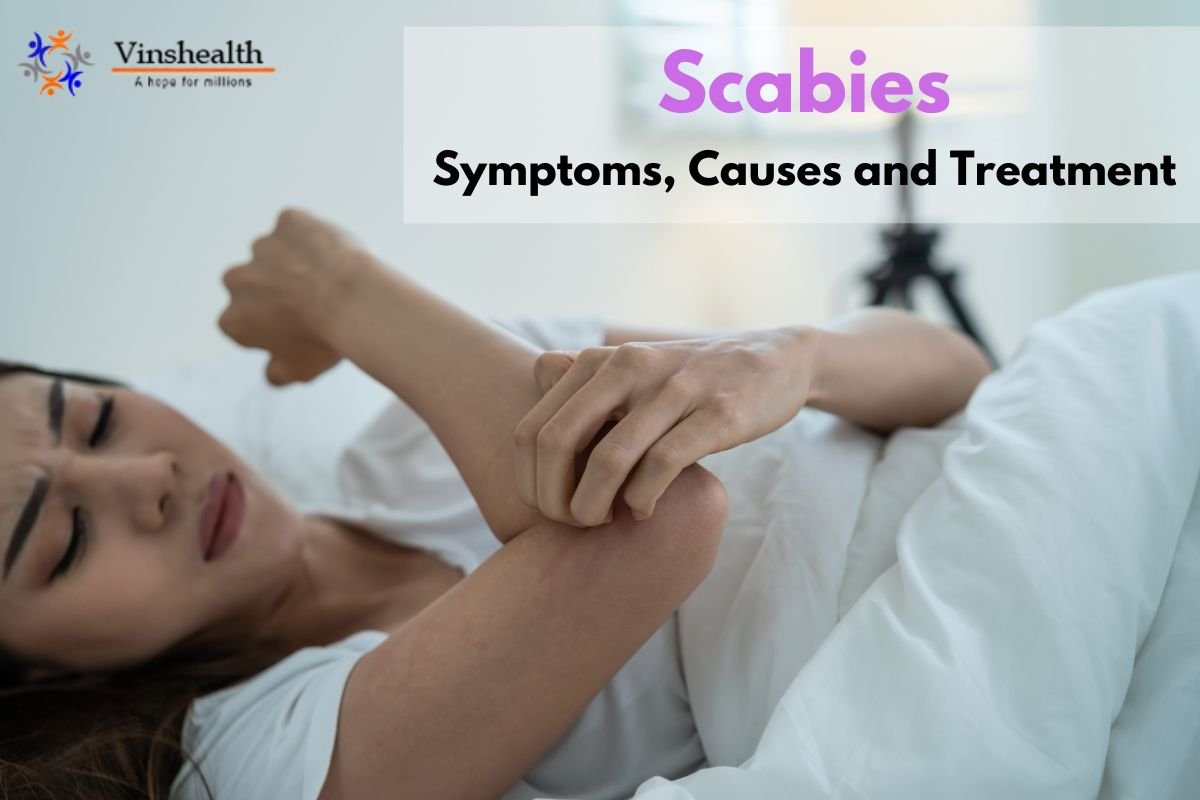Scabies: Symptoms, Causes and Treatment
- 2023-08-21
- Scabies, Scabies treatment
If you're facing the discomfort of scabies, worry not. Scabies treatment can bring relief and help you get back to feeling comfortable in your own skin. Scabies, caused by tiny mites that burrow under the skin, can lead to intense itching and rashes. But with the right treatment, you can bid these pesky mites goodbye.
Table of Content
- What is Scabies?
- Scabies Symptoms: How to Identify Scabies?
- What Causes Scabies?
- Scabies Treatment: How to Cure Scabies Fast
- Home Remedies For Scabies
- Frequently Asked Questions (Scabies Treatment)
What is Scabies?
Scabies is a skin disease caused by tiny mites that burrow beneath the skin. It makes your skin itchy and irritated. To figure out if you have scabies, watch for some signs. You might see red, bumpy rashes and experience intense itching, especially at night. Common places affected are wrists, elbows, and between fingers.
Scabies can be really uncomfortable, but with the right treatment, you can get rid of those pesky mites and the itching they cause. Just make sure to follow the instructions carefully and keep your surroundings clean.
Get Free First Consultations
Call Us: 9643264509
Email: info@vinshealth.com
Scabies Symptoms: How to Identify Scabies?
As you know scabies is a common skin condition caused by tiny mites. It's important to recognize its symptoms, as early detection can lead to timely treatment. Here, we'll outline the scabies symptoms in a clear and straightforward manner.
Scabies Symptoms:
- Itchy Skin
- Rash
- Burrows
- Spread
Being aware of scabies symptoms is crucial for its early identification and treatment. The intense itching, rash, burrows, and other signs should not be ignored, especially if they worsen or spread. If these symptoms are observed, seeking medical attention promptly can help prevent complications and ensure a quicker recovery.
Get Free First Consultations
Call Us: 9643264509
Email: info@vinshealth.com
What Causes Scabies?
Scabies is caused by an infestation of the Sarcoptes scabies mite. Here are the key factors that contribute to the spread of scabies:
- Mite Infestation: Scabies is triggered by a mite called Sarcoptes scabiei. These mites are the root cause of the condition.
- Skin Burrowing: The mites burrow into the upper layer of the skin, forming tiny tunnels. This is where they live and lay eggs.
- Spread Through Contact: Scabies is highly contagious. It spreads through close and direct skin contact with an infected person. This includes holding hands, hugging, or sexual contact.
- Crowded Areas: Places where people are in close proximity, like schools, nursing homes, and crowded living conditions, can promote the spread of scabies.
- Items and Clothing: Scabies mites can survive outside the body for a short time. If you share clothing, bedding, or towels with an infected person, the mites can transfer to you.
- Prolonged Contact: The mites do not move quickly, so prolonged skin contact is usually needed for transmission to occur.
- Symptom Onset: It takes some time for symptoms to appear after infestation. This delay is due to the time it takes for the mites to burrow and lay eggs.
- Itching Allergy: The body reacts to the mite's presence and its waste by releasing histamines, which cause intense itching and a rash.
- Personal Hygiene: Scabies can affect anyone, regardless of personal hygiene. It's not a sign of being dirty.
Understanding these causes empowers us to take preventive measures and adopt good hygiene practices to minimize the risk of scabies infestations.
Scabies Treatment: How to Cure Scabies Fast?
If you're dealing with scabies, you're likely eager to find fast relief. Fortunately, there are practical steps you can take to alleviate the symptoms and promote healing without delay.
Ways to Cure Scabies Quickly:
1. Cleansing Routine: Start by maintaining good hygiene. Take regular, lukewarm showers and use a gentle, fragrance-free soap. This helps remove mites and their eggs from the skin's surface.
2. Prescription Medications: Consult a healthcare professional for proper diagnosis and treatment. They might prescribe a medicated cream or lotion containing permethrin or other effective ingredients. Apply it as directed to kill the mites and prevent further infestation.
3. Medication Application: Gently massage the prescribed cream or lotion onto clean, dry skin. Focus on covering all areas from the neck down. Leave it on for the recommended time before washing it off.
4. Wash Clothing and Bedding: Wash all clothing, bedding, and towels in hot water and dry them on high heat. This helps eliminate any mites that might be present on these items.
5. Avoid Close Contact: During treatment, avoid close physical contact with others to prevent the spreading of the infestation. Inform those you've been in contact with so they can take precautions as well.
6. Trim Nails: Short nails can help prevent further skin damage from scratching. Keeping them clean and trimmed reduces the risk of secondary infections.
7. Cool Compresses: If itching persists, apply cool, damp compresses to affected areas. This can help soothe the skin and alleviate discomfort.
8. Over-the-Counter Remedies: Some over-the-counter creams and lotions might provide relief from itching. Look for products with ingredients like hydrocortisone or calamine to reduce irritation.
Scabies can be an uncomfortable and bothersome condition, but with the right approach, you can find relief quickly. By following these steps for scabies treatment you'll be on your way to a faster recovery.
Get Free First Consultations
Call Us: 9643264509
Email: info@vinshealth.com
Home Remedies For Scabies
If you want to get rid of scabies at home, there are effective home remedies that can help. These remedies can provide relief from itching, redness, and discomfort. Let's explore some simple yet powerful treatments you can try.
- Neem (Indian Lilac): Neem's natural anti-inflammatory and antiseptic properties can help soothe itching and prevent infection. Applying neem oil or creating a neem paste can provide relief.
- Tea Tree Oil: Renowned for its antimicrobial qualities, tea tree oil can be diluted with carrier oil and applied to affected areas to mitigate itching and inflammation.
- Aloe Vera: Aloe vera's cooling effect can alleviate itchiness and redness. Applying fresh aloe vera gel can also help keep the skin moisturized.
- Turmeric: Its anti-inflammatory and healing properties can assist in soothing scabies symptoms. Creating a paste from turmeric and water and applying it can be beneficial.
- Cloves and Cinnamon: Boiling cloves and cinnamon in water and using the resultant solution for a warm bath may provide relief from itching.
- Cayenne Pepper: Its natural compounds can temporarily numb nerve endings and ease itching. Mixing cayenne pepper with warm water to create a topical solution may be helpful.
- Coconut Oil: Coconut oil's moisturizing nature can prevent excessive dryness and ease discomfort. Applying virgin coconut oil can support the healing process.
- Sulfur Ointment: Over-the-counter sulfur ointments can help eliminate mites and control symptoms. Following the product instructions is essential.
- Hygiene Practices: Washing all bedding, clothing, and personal items in hot water can prevent reinfestation and aid recovery.
Remember that consistency is key when trying home remedies for scabies. You might need to repeat these treatments for a few weeks to completely eliminate the mites.
In conclusion, Scabies treatment is effective and accessible. Identifying the symptoms, seeking professional advice, and following the prescribed regimen can help you get rid of the itch and discomfort. Remember, early diagnosis and proper treatment not only bring relief to you but also protect those around you from getting infected. So, take action, and say goodbye to scabies.
Get Free First Consultations
Call Us: 9643264509
Email: info@vinshealth.com
Frequently Asked Questions (Scabies Treatment)
Q: What is scabies?
A: Scabies is a contagious skin condition caused by the Sarcoptes scabies mite. It leads to intense itching, especially at night, and is often characterized by small red bumps or burrow lines on the skin.
Q: Do I need to treat everyone in my household if one person has scabies?
A: Yes, it's recommended to treat everyone in the household, even if they are not showing symptoms. Scabies is very contagious and spread easily from person to person by close physical contact. Treating everyone helps prevent re-infestation.
Q: How long does it take for scabies treatment to work?
A: It may take a few days to a couple of weeks for the itching to subside after treatment. However, some itching might persist for a few weeks due to an allergic reaction to the mites and their waste. Follow your doctor's recommendations and complete the full treatment course.
Q: Can I use the scabies treatment if I'm pregnant or breastfeeding?
A: It's important to consult your healthcare provider before using any scabies treatment if you're pregnant or breastfeeding. They will be able to recommend safe treatment options for your situation.
Related Posts
Skin Allergy Doctor in Delhi
Pigmentation Treatment
Best Eczema Specialist Doctor in Delhi
Melasma Treatment in Delhi
Leucoderma Treatment
Wart Removal Treatment
Acne Treatment
Athlete's Foot
Cyst
Hives (Urticaria)
Botox Treatment
Botox Treatment Price in India








Thanks for the valuable information.
2023-01-05 00:00:00